It's okay to Make Something Nobody Wants

Products seem to be made for users, but I think this might be an illusion; they are more like a medium for self-expression.
Different expressions, conceived by various minds, undergo a form of natural selection, with the surviving expression being the one that resonates most with users.
I mean, the process unfolds like this: you create something not because “I think they might need this,” but because “I find this so fucking interesting.” Then, when others use your product, they feel the same emotions you did, and they say, “I find this so fucking interesting.”
From this perspective, a product is like a container for emotions; the creator puts them in, duplicates it a thousand times, and users extract them from the product.
You can’t be devoid of emotion and expect users to experience emotion after using it.
I think it’s okay to make something that nobody wants. All you need to do is to make sure you’ve fully expressed your emotions in this product.
But in most cases, people care too muc or think too much, and end up making something even they themselves don’t like it.
If everyone made things they really liked, we’d have a lot more cool stuff.
This is tougher than it seems. Because if you have expectations, you get worried, stressed, and lose your feelings right away.
In simpler terms, people can’t make something they don’t like and hope others will like it.
Maybe that’s why a lot of cool stuff started as side projects. People don’t expect much from side projects; they do it more for fun or for themselves.
We humans are machines that only understand ourselves. The only way we could understand someone else is through ourselves. We really don’t get how a flower feels because it doesn’t have a brain or eyes, and we don’t have leaves.
Given this, I don’t think any “I don’t get it, but I know you need it, so I made it for you” would actually work.
Later, when talking with my girlfriend about this, I suddenly understood Steve Jobs, and others like him, much more deeply.
People often complained about Jobs: when his team showed him their work, he would say “It doesn’t feel right,” and when they asked how to fix it, he said “I don’t know, make it better and show me again, and then I’ll know.”
This confused a lot of people. He found problems but didn’t know how to fix them or why they were problems.
Now, I totally get where Jobs was coming from.
When we make something and want users to feel what we feel, we first have to feel it a lot ourselves. Jobs was this kind of “feeling detector,” and this is the real deal.
I believe the real skill in making products isn’t some “making products” skill, but rather a skill in feeling your own subtle emotions.
Can others feel what Jobs felt? I think so. After the iPhone came out, everyone loved it, showing that they felt it.
The only difference is that during the making of this emotional medium, Jobs could perceptively sense those subtle emotions, while most participants might not perceive their own emotions due to various reasons.
This also explains why reducing expectations and bringing attention back to the present is crucial for making product. Because this helps you perceive those subtle emotions. If your mind is filled with external chaos, it would be harder to notice those emotions.
from Hacker News https://ift.tt/46DZ0WB
No comments:
Post a Comment
Note: Only a member of this blog may post a comment.